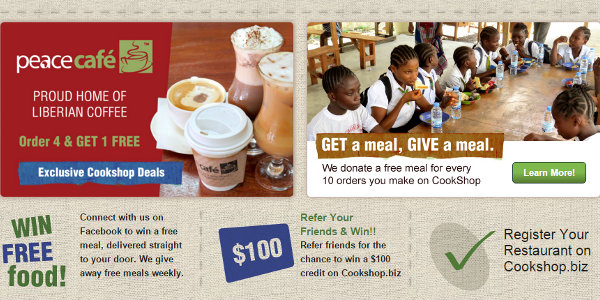Liberian online food delivery start-up survives Ebola crisis

Cookshop is an online platform that allows customers to order food from almost all major restaurants in Monrovia, the Liberian capital. Users can register on the site, browse a selection of restaurant menus, and place an order that Cookshop delivers via motorcycle.
Cookshop is run by Charles Cooper and Mlen-Too Wesley. Both are American-educated Liberians who have returned to play a role in the country’s post-war reconstruction.
Cooper talks to Brooks Marmon about his company.
Give us your elevator pitch.
Cookshop.biz is an online food delivery service that lets you browse and order from the top restaurants in Monrovia via a mobile device or computer. We are a homegrown enterprise, founded by Liberian ICT professionals, funded by Liberian investors, and powered by local food vendors. As creators of local content, and employers of Liberian youth, we represent the evolution of the ICT sector in Liberia. Our aim is to be the online destination for food in Liberia.
How did you finance your start-up?
My business partner (Mlen-Too Wesley II) and I developed a business plan and pitched our idea to private investors and groups in Liberia that we felt would be a good fit for Cookshop. We were ultimately funded by a private Liberian investor.
If you were given US$1m to invest in your company now, where would it go?
We would first expand our delivery network and diversify our revenue streams in Liberia, for example we are in the process of launching a complimentary online grocery delivery service. Secondly, we would extend our business to a regional market outside of Liberia.
What risks does your business face?
Lack of infrastructure is a key challenge for any business in a developing economy. Electricity is extremely costly for us and notoriously unreliable, and when our customers don’t have access to power, they may not have access to our service.
Another potential, but unlikely, risk is a decrease in broadband usage in our target market due to affordability issues. However, the arrival of the ACE undersea internet cable has led to a drastic increase in broadband access in Liberia and a drop in associated costs.
The most pressing and unexpected risk we’ve faced is the Ebola virus health crisis, which decimated the Liberian economy in 2014. However, our post-Ebola growth has been exponential, and Cookshop has more than risen to meet that challenge.
So far, what has proven to be the most successful form of marketing?
We identified our target audience and speak to them directly with consistent messaging via email, SMS and printed promotional material. We also keep an online presence at Facebook, Twitter, Google+, WhatsApp, and Tumblr.
Describe your most exciting entrepreneurial moment.
At the height of the health crisis in Liberia in 2014, we were forced to temporarily shut down our service out of concern for the safety of our employees and customers. After a successful relaunch in 2015 we’ve more than tripled the number of users at Cookshop.biz and quadrupled our average number of orders per day.
The decision to relaunch Cookshop took a lot of faith in the viability of our strategy and in our ability to execute under difficult circumstances, and the daily validation of that faith is the kind of reward that entrepreneurs live for.
Tell us about your biggest mistake and what you learnt from it.
We initially underestimated how severely the unreliability of local infrastructure would affect our service, but we quickly adapted. Though we are a tech start-up, we now have the ability to run Cookshop completely via mobile phone and SMS in the eventuality of a power outage. We also source our broadband connectivity from multiple providers so that the platform is continuously operational.

